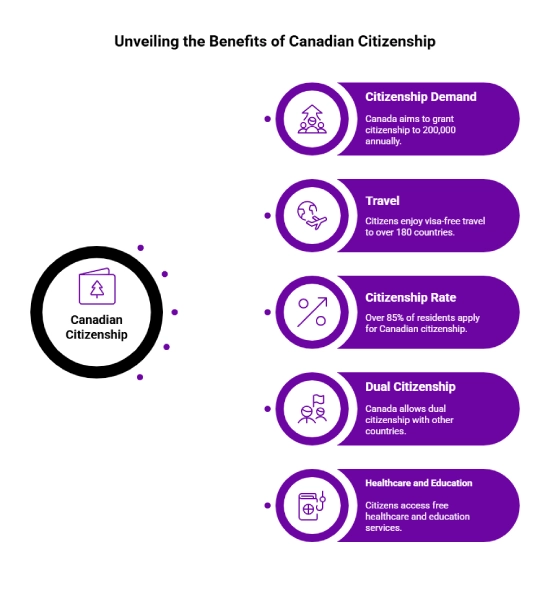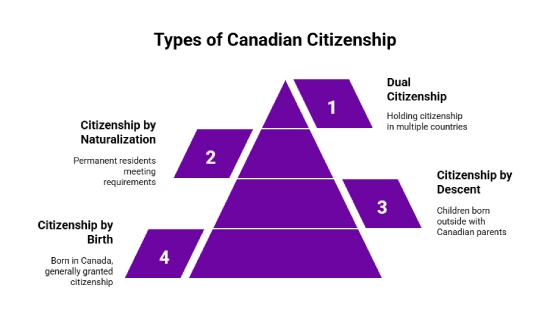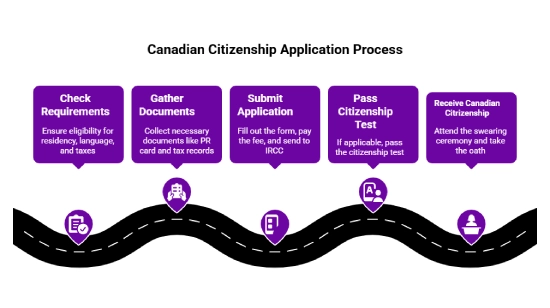Becoming a Canadian citizen allows individuals to enjoy the rights and duties of being part of a diverse and successful country. If you are a permanent resident or a new immigrant, knowing how to become a citizen can assist you plan your future.

Canadian citizenship gives a person complete membership in Canada, along with all the associated rights. If you are a citizen, you're seen as part of a very diverse and welcoming country. Citizenship lets people live, work, and take part in Canada’s political, social, and financial activities.
Important Parts of Canadian Citizenship:
The benefits of Canadian citizenship are given below.
To apply for Canadian citizenship, you must:
The primary types of Canadian citizenship are given below.

To qualify for Canadian citizenship, you must satisfy these conditions:
Applicants must meet the physical presence requirement, 1,095 days spent in Canada in the five years immediately before applying. These days do not need to be continuous. Days you spent in Canada as a temporary resident or protected person before becoming a PR may count as half-day credits, up to a maximum of 365 days.
If you are aged 18 to 54 when you sign your application, you must prove speaking and listening proficiency at Canadian Language Benchmark (CLB) / NCLC level 4 or higher in English or French. Acceptable proofs include:
Results from an approved test: IELTS (General Training), CELPIP‑General LS for English, TEF Canada or TCF Canada for French
Canadian secondary or post‑secondary education completed in English or French
Government-funded language training certificates
Applicants under 18 or 55 and above are exempt.
The procedure to apply for Canadian citizenship is given below.
Step 1: Make sure you meet the requirements for residency, language, and taxes.
Step 2: Collect your PR card, language test, tax records, and other needed papers.
Step 3: Fill out the citizenship form, pay the fee, and send it to IRCC.
Step 4: If you are 18-54, you will need to pass a citizenship test.
Step 5: Once approved, attend the swearing ceremony and take the oath to become a citizen.

Online application: Ideal for most applicants, it allows you to track your status and receive updates directly via your IRCC account.
Paper application: Accepted in specific circumstances, such as certain stateless cases or citizenship through minors in care. Processing time is generally longer, and you must mail the forms and documents.
Choose the method that matches your eligibility and documentation path.
Canadian citizenship is acquired automatically by birth or descent.
Detailed information about the application cost of Canadian citizenship is given below.
| Applicant Type | Application Fee (CAD) |
| Adult Applicants (18 years and older) | $630 |
| Minor Applicants (under 18 years old) | $100 |
Detailed information about the processing time for Canadian citizenship applications is given below.
| Application Type | Estimated Processing Time |
| Standard Adult Citizenship Application | 12 months (average) |
| Minor Citizenship Application | 12 months (average) |
| Citizenship Application for Applicants with Complex Cases | 12–24 months (depending on individual circumstances) |
| Citizenship for Refugees or Protected Persons | 12–18 months (depending on specific case details) |
Canada lets people have dual citizenship. This means you can still be a citizen of your home country when you become a Canadian citizen. But, some countries do not allow dual citizenship, so you should check the rules of your home country, before you apply for Canadian citizenship.

| Factor | Permanent Resident (PR) | Canadian Citizen |
| Right to live and work in Canada | Yes | Yes |
| Validity | Indefinite (card valid up to 5 years) | Permanent (no renewal needed) |
| Voting and political rights | NA | Yes |
| Required residency to keep status | 730 days within 5 years | None once citizenship is granted |
| Travel documentation | Requires valid PR card or PRTD to re‑enter Canada by plane | Use Canadian passport |
| Eligibility to sponsor | PRs can sponsor after fulfillment of conditions | Citizens can sponsor broader categories of relatives |
Y-Axis is a leading immigration and visa consultancy in Canada, providing expert advice to people who want to settle in other countries. With years of experience and a history of success, Y-Axis helps clients with the difficulties of immigration, providing services to both individuals and businesses.
Y-Axis Services for Canadian Citizenship:
Explore what Global Citizens have to say about Y-Axis in shaping their future
Canada PR Visa
Sameer got Permanent Resident Visa for C
Read More...
Canada Work Permit Visa
Varun provided us with great Y-Axis Revi
Read More...
Canada PR Visa
One of our client Virendra availing his
Read More...
To be eligible for Canadian citizenship, applicants need to be permanent residents, have resided in Canada for a minimum of three years out of the past five, show competence in either English or French, and have filed taxes if necessary. If these standards are met, a person can apply through Immigration, Refugees, and Citizenship Canada (IRCC). After sending in the application, those aged 18-54 might need to pass a citizenship test and, if approved, attend a citizenship ceremony.
The processing times for Canadian citizenship applications are given below.
| Application Type | Estimated Processing Time |
| Standard Adult Citizenship Application | 12 months (average) |
| Minor Citizenship Application | 12 months (average) |
| Citizenship Application for Applicants with Complex Cases | 12–24 months (depending on individual circumstances) |
| Citizenship for Refugees or Protected Persons | 12–18 months (depending on specific case details) |
Canadian citizenship may be taken away in serious situations, like when it was gained through dishonest means. A person can also lose their citizenship if they choose to give it up, though this doesn't happen often. Citizenship might also be questioned if someone is involved in major crime or terrorism. Still, simply living in another country or not meeting the requirements to live in Canada won't cause a person to lose their citizenship.
Yes, you must take a test to become a Canadian citizen. Individuals between 18 and 54 seeking citizenship must pass a test covering Canadian history, values, and government. This test includes 20 multiple-choice questions about Canadian facts, history, rights, and duties. Those who pass will be invited to a ceremony to take the citizenship oath and become Canadian citizens. This test is not required for applicants over 54.
No, you cannot apply for Canadian citizenship if you have a criminal record. Having a criminal record, especially for grave offenses, can affect your Canadian citizenship application. A past felony conviction can cause delays or rejection. Small-time offenses or older incidents might not automatically disqualify you, but these are still part of the review. If you've finished your sentence and meet every other requirement, you can still apply.
The application fees for Canadian citizenship are given below.
| Applicant Type | Application Fee (CAD) |
| Adult Applicants (18 years and older) | $630 |
| Minor Applicants (under 18 years old) | $100 |
Yes, you can apply for Canadian citizenship if you are a Canadian permanent resident and meet the eligibility conditions. If you are a permanent resident in Canada and meet certain requirements, you can apply for citizenship. You need to have lived in Canada for a minimum of three years out of the past five. You also need to show that you can speak English or French. If needed, you must have filed your taxes. Once you meet these conditions, you can send your application to IRCC. Keep your permanent resident status current while you apply.
To apply for Canadian citizenship, you must submit the following documents.
These documents assist in confirming your citizenship eligibility and help us process your application.
No, you do not need have to live in Canada at the time of applying for Canadian citizenship, but you must fulfil the residency requirements. To apply for Canadian citizenship, residence in Canada at the time of application is not needed, but you must meet certain residency requirements. To meet these, you must have physically lived in Canada for a minimum of three years out of the past five. Time spent outside Canada can count toward the residency requirement if you were employed by a Canadian company or the Canadian government, or if you were living with a Canadian spouse or parent.
Yes, you can have dual citizenship as a Canadian. Canada does allow dual citizenship, so you can be a citizen of Canada and another country at the same time. But, some countries do not allow this, or they might ask you to give up your original citizenship if you become Canadian. It is essential; to check the laws of your home country to know what happens if you have dual citizenship. It could change what you owe, what you can do, and your legal standing in both countries.
Yes. If at least one of your parents was a Canadian citizen at the time of your birth, you may already be a citizen. Otherwise, you can apply for citizenship once you meet residency and eligibility requirements.
You can track your application online through your IRCC (Immigration, Refugees and Citizenship Canada) account or by contacting IRCC directly for updates.
No. You must be physically present in Canada for at least 1,095 days (3 years) within the last 5 years before applying for citizenship.
No. You must have no outstanding tax obligations to the Canada Revenue Agency (CRA). Your taxes must be up to date for at least 3 years within the 5-year period before applying.
Not necessarily. As long as you meet the PR residency requirements and are not under removal order, you can apply for citizenship even if your PR card has expired.
If you fail the written test, you’ll be invited to attend an interview with a citizenship officer, who will assess your knowledge of Canada and your language skills verbally.
No. Only applicants aged 18 to 54 years need to meet language and knowledge (test) requirements. Children under 18 are exempt.
Yes. The online citizenship application is available for most applicants, though some categories (e.g., minors, representatives) must still submit a paper application.